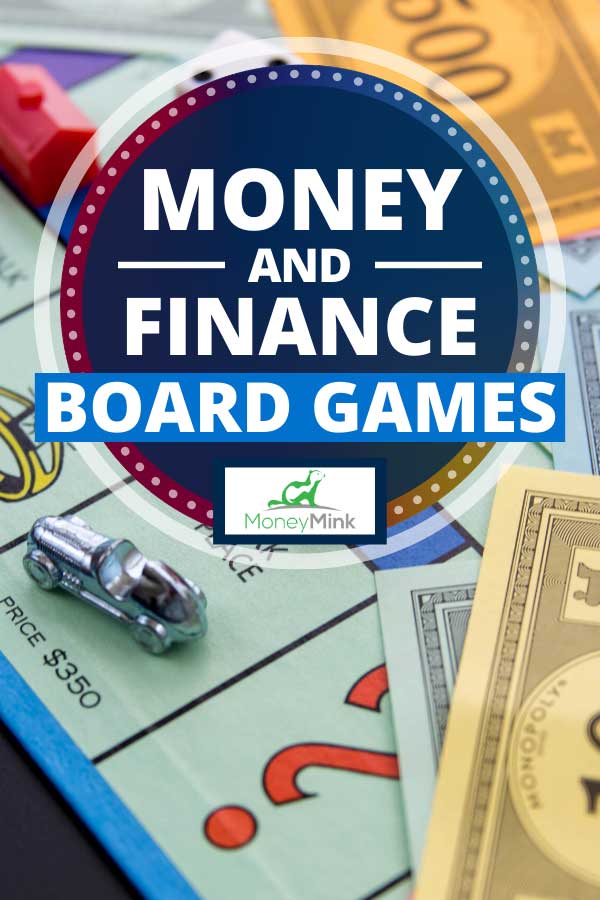There are many ways to learn about how money works. Usually, it's in a book or a class. But sometimes it can be in a casual, fun board game. There are quite a few board games that have a theme around money and financial management.

Today, we'll be sharing with you ten board games we think you should look into. You'll have a blast trying to win, and you'll learn some useful money management skills along the way.
1. Cashflow
If you've been reading personal finance books, odds are you may have heard of Robert T. Kiyosaki, the author of New York Times best-seller, "Rich Dad, Poor Dad."
Already a fan of the book? This game is a great fun way to educate your youth about money. From this game, you and your kids will learn:
- About what financial habits keep people stuck in the rat race
- That it's all about the money you keep, not earn
- What the rich do differently to keep their cash flow going
- The importance of owning assets
This game requires two to six players and can take from 30 minutes to 3 hours to complete. Your objective is to be the first escape the rat race and achieve your dream or make $50,000 in passive income.
Click here to purchase this game on Amazon.
2. Act Your Wage
Another big name in the personal finance realm is Dave Ramsey, famously known for his debt snowball strategy. His strategy is a 7-step process for getting out of debt. Act Your Wage is based on baby step two: paying off all of your debts in order by balance size, from smallest to largest.
Up to four players start the game with some money, three debt cards, and a Situation card. The Situation cards indicate your socio-economic status, and the debt cards show how much and what type of debt you have.
Your goal is to be the first to pay off all of your debts. You accomplish this by going across the board spending or saving your way to debt freedom.
Players learn useful financial tips like building an emergency fund, using the debt snowball method, and other financial advice.
Click here to view the game on Amazon.
3. Settlers of Catan
Settlers of Catan isn't directly about managing money, but about managing resources and assets. But that hasn't stopped this game from selling 25 million copies in over 30 languages.
This is a good game for you and your family to learn about resource management. In Catan, you learn about and play to get the best location, resource trading, diversification of your resources, and flexibility.
Your goal is to be the first to reach ten victory points. You get victory points by building settlements and cities. Building relationships with other players is the key to success.
Click here to buy this game on Amazon.
4. The Game of Life
Here's a game you'll know of, especially since it's existed for over 160 years. Through those years, many variations of the original have been made: Star Wars, The Simpsons, even Spongebob editions.
Made for two to six players aged eight and up, this game tries to parallel the many ups and downs of real life. The objective is simple: have the most Life titles and money by the end of the game. You do so by going across the board, picking up career or college cards, and avoiding 'you're fired' or 'mid-life crisis' spots. Once everybody 'retires' players count up their money, the player with the most remaining wins.
This game puts a fun spin on real-life decisions such as choosing college or careers, getting married, buying a house, and paying off loans. It's a great way to "practice" life before actually doing it.
Click here to buy the game on Amazon.
5. Go For Broke
Now we have a game that shows you what NOT to do with your money. Go For Broke starts players with a million dollars. The objective: to be the first to LOSE all your money. You do that by landing on real estate, casino, racetrack, roulette, or stock market spots.
Contrary to most other finance board games, this one shows players how easy money can deplete if not appropriately managed. Technically, if you lose this game, you're winning; it shows potential that you can manage your money right.
This game from 1985 has had a few special editions of the original.
Click here to buy the vintage game on Amazon.
6. Charge Large!
Charge Large is a game for two to four players that teaches you how to use money and debt to buy property strategically. Players start with a gold credit card and $850 million. Your objective is to be the first player to have a black credit card, $2.5 billion, and no debt.
Achieving that goal isn't easy. You have to strategically know how often to spend money and when the best times to use credit—doing both impacts your chances to upgrade your credit cards and grow your funds. It's a great game to help you understand good debt versus bad debt.
Click here to buy this game on Amazon.
7. Monopoly
And now we bring you probably the most well known financial literacy based board game in existence. This is the game of real estate investing that has caused families and friends to fight numerous times while playing. Quite a few finance-focused board games are spin-offs of this one.
The game starts with players receiving one game piece and $1500. Players go around the board collecting properties and charging others who land on it. Players go bankrupt when they can't afford to pay the landlords or the bank.
If you can prevent everyone from yelling at each other while playing, you'll learn a good bit about how real estate works. This could spark a desire to get into real estate investing.
Click here to purchase this game on Amazon.
8. StartUp
One of the games that act like Monopoly is StartUp. A high-risk, high-reward where you're building up your asset. The asset in this particular game is a five-level corporate headquarters.
Your goal is to complete the headquarters (reaching all five levels) first. To do so, players pay cash or sell partial ownership of their company. It's a fantastic way to learn the basics of business, such as investments and networking.
Click here to purchase the game on Amazon.
9. ThriveTime for Teens
This one is for the soon-to-be young adults in the house. ThriveTime For Teens guides players through life starting as a teen. This means getting a part-time job, make major life purchases like cars or college, and starting a business.
This game is similar to CashFlow because it was developed with the help of Sharon Letcher, co-author of 'Rich Dad Poor Dad.'
Click here to purchase the game on Amazon.
10. Million Dollar Challenge
Last on our list is the most investment focused board game mentioned. As the title says, your goal is to reach a million dollars first. It's a little challenging to play as your playing time is mostly learning advanced investing topics.
It's rarer than the other games on the list, but you can purchase the game on Amazon by clicking here.
Conclusion
We hope that you'll consider getting any of these games to have a fun time learning about how money works. You may learn some safe ways to use credit cards along the way.













